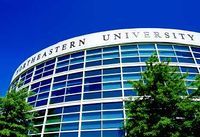| Eta Omicron | |
|---|---|
| HO | |
 | |
| Founded | March 27, 2010 |
| College | Northeastern University |
| Location | Boston, MA |
| Homepage | Eta Omicron Website |
| Media related to Eta Omicron Chapter | |
Eta Omicron, Northeastern
Northeastern University established in 1898 in Boston, Massachusetts
Founded March 27, 2010
86 charter members
143 initiates (as of June 2012)
Some of Eta Omicrons’s Outstanding Alumnae: (If you have chapter alumna who have received recognition in any of these three categories, please list them with the date(s) of recognition.)
Fraternity Council Officers:
Fraternity Loyalty Award Recipients:
Fraternity Alumnae Achievement Award Recipients:
The Early Years:
Northeastern University was established in 1898 as the Evening Institute for Younger Men at the Huntington Avenue YMCA in Boston. Its first class was held October 3, 1898. The institute catered to the needs of the rapidly growing immigrant population in Boston. Within a few years of its formation, it offered classes in law, engineering and finance. In 1909, the school began offering day classes, and it moved to a new location on Huntington Avenue in 1913. The school was officially organized as a college in 1916, and in 1922 it was renamed Northeastern University of the Boston Young Men's Christian Association. In a period of rapid campus expansion, the university purchased the Huntington Avenue Grounds (former Boston Red Sox ballpark) in 1929, but did not build on the land due to financial constraints during the Great Depression.
Northeastern today is a private, secular, coeducational research university. It has eight colleges and offers undergraduate majors in 65 departments. At the graduate level, the university offers more than 125 programs and awards masters, doctoral, and professional degrees. The university is the home of more than 35 specialized research and education centers. Its main campus is located in the Fenway Cultural District of Boston. Northeastern is classified as a RU/H institution (high research activity) by the Carnegie Foundation for the Advancement of Teaching.
Among Northeastern's past and present faculty are several Guggenheim Fellows and a MacArthur Foundation “Genius Award” winner, a former Democratic nominee for President of the United Stateshttp://en.wikipedia.org/wiki/Northeastern_University - cite_note-7 and a Pulitzer Prize winner.
Colonization and Installation
Following an open house attended by more than 200 interested women, interviews with Boston-area Kappa alumnae and the colonization team and an invitation-only, iris-adorned brunch, the charter members of Eta Omicron colony were pledged on January 30, 2010.
Eta Omicron was installed March 27, 2010, with 86 charter members. Northeastern’s director of fraternity and sorority life challenged the charter members to continue their excellent work as they begin a new era of sorority life on campus and in the Boston community.
Eta Omicron was the seventh NPC women’s fraternity to be established at Northeastern. The university enrolls more than 15,000 undergraduate and 5,000 graduate students where 9,600 students were residents of the campus dorm and apartment structures. With more resident students than ever, the desire for more students to be part of a Greek-letter community increased. Northeastern’s signature cooperative education program (co-op), as well as student research, service learning and global learning, builds the connections that enable students to transform their lives and the lives of others.
The university’s outstanding support of Greek life was one of many attractions to this institution for Kappa. The charter new member class boasted the highest GPA of any Greek-letter organization at Northeastern. Eta Omicron members were campus and community leaders bringing much to this new chapter as leaders, scholars and philanthropy-focused women.
Installing officers were Fraternity President Denise Rugani, UC Davis; Director of Membership Elizabeth Bailey, Mississippi; Region 1 directors Claire St. Martin Collins, Emory, and Kelly Matyas Magyarics, Pittsburgh; Rho Province Directors Allyson Kinney, Connecticut, and Julie Carley Reilly, Puget Sound; Coordinator of Chapter Development Janice Franklin Larson, Akron, and Chapter Consultant Melissa Shearer, Vanderbilt.
Eta Omicron Chapter was Kappa’s 137th active chapter and complemented the growing, service-oriented campus Panhellenic consisting of seven other NPC groups—Alpha Epsilon Phi, Delta Phi Epsilon, Delta Zeta, Kappa Delta, Sigma Delta Tau, Sigma Sigma Sigma and Sigma Kappa colonizing in Spring 2013.
Highlights of 2011-2019
From Chapter’s History Report: (Scholarship, group honors/awards, traditions, special events, changes on campus or within chapter, overall nature of the chapter, chapter goals, challenges and how they were overcome, etc.)
The spring of 2012 proved to be an eventful semester for Eta Omicron. The chapter earned the Most Improved Chapter Award for the year of 2011, showing that its efforts to be more involved in the Fraternity and sorority life community were recognized. During Greek Week, the chapter paired with Kappa Sigma, taking part in Greek Sing and winning Greek Olympics! The chapter's GPA for the spring 2012 semester was 3.361 placing third among all Panhellenic sororities. The chapter sponsored its second annual Kappa Kickoff, where the members raised almost $1,000 with nearly 30 participating teams.
Eta Omicron is composed of a wide range of individuals who bring unique personalities and ideas to the chapter. Everyone embraces all of the members and their points of view, striving to create an accepting atmosphere where everyone can thrive and get involved. Through the diversity as a chapter, the members challenge themselves to uphold Kappa’s values every day and truly live up to Kappa standards.
Fraternity Awards: At the 2012 Convention, Eta Omicron earned honorable mention in academic excellence and Panhellenic relations.
Note to Chapter Registrar: Please refer to your chapter archives including chapter meeting minutes and back issues of The Key to fill in any gaps in the above historical highlights. If your chapter archives are not complete, please research your university library, campus newspaper and yearbook archives for newsworthy information about your chapter. Please double check your work for accuracy. Contact chapter Advisory or House Board members, local Alumnae Association members, or your Province Director of Chapters for assistance. Your efforts will ensure a complete and accurate history of your chapter for future generations to enjoy!